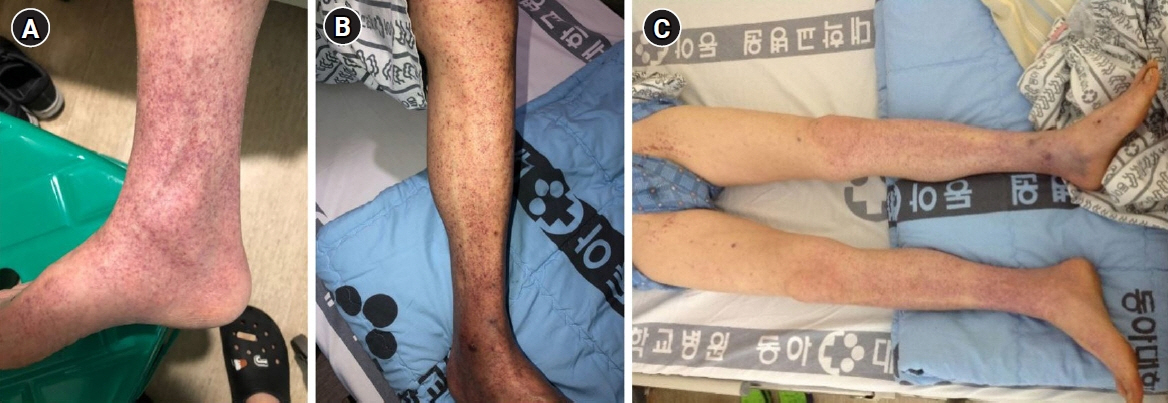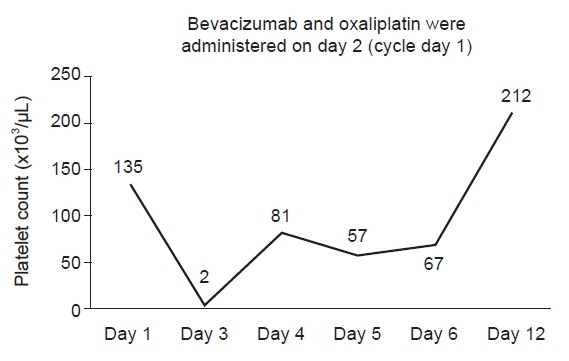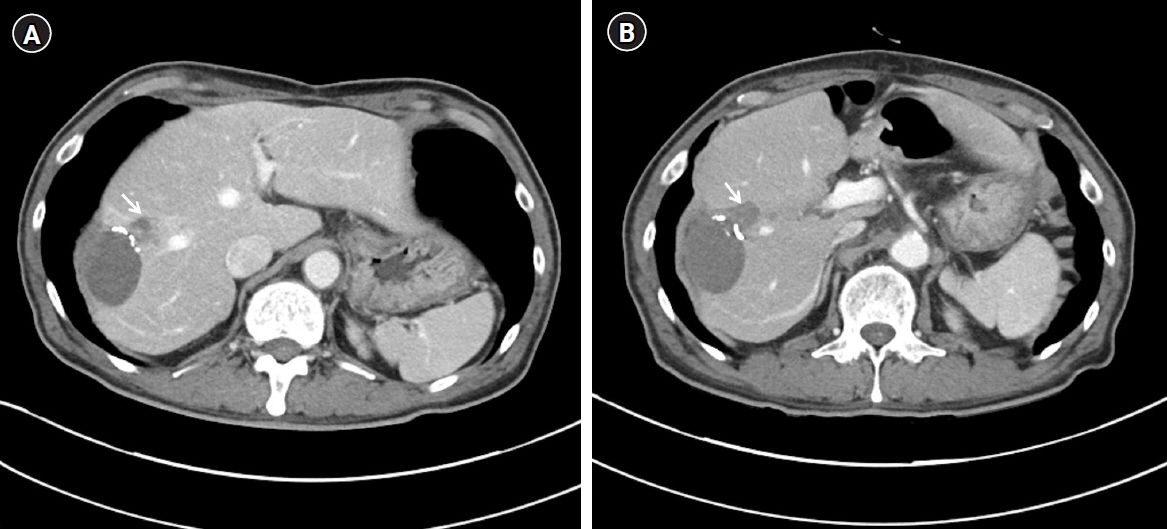Kosin Med J.
2023 Dec;38(4):300-306. 10.7180/kmj.23.121.
Drug-induced immune-mediated thrombocytopenia due to bevacizumab-FOLFOX therapy: a case report
- Affiliations
-
- 1Division of Gastroenterology, Department of Internal Medicine, Dong-A University College of Medicine, Busan, Korea
- KMID: 2549504
- DOI: http://doi.org/10.7180/kmj.23.121
Abstract
- Drug-induced immune thrombocytopenia (DITP) is a very rare disease, with an estimated annual incidence of 10 cases per million. Oxaliplatin and irinotecan are widely used as chemotherapy for high-risk stage II and III colorectal cancer, and DITP has been reported to occur in patients using those agents. To treat unresectable metastatic colorectal cancer, bevacizumab is used in combination with oxaliplatin or irinotecan, and there have been a few reports of DITP cases in patients receiving that regimen. In this report, we describe a 68-year-old male patient with metastatic colon cancer (KRAS mutant type) to the liver and lung who developed acute immune-mediated thrombocytopenia due to bevacizumab-FOLFOX (5-fluorouracil, leucovorin, and oxaliplatin) therapy. During treatment, he showed purpura in his lower extremities on 21st cycle day 2. Lab work revealed a platelet count of less than 2,000/mL, reflecting a decrease from 135,000/mL at the start of the cycle 1 day prior. He did not have any other types of cytopenia or significant changes in laboratory findings. We diagnosed DITP due to bevacizumab-FOLFOX, and the patient did not show isolated thrombocytopenia after switching to Ziv-aflibercept-FOLFIRI (5-fluorouracil, leucovorin, and irinotecan).
Figure
Reference
-
References
1. Aster RH, Bougie DW. Drug-induced immune thrombocytopenia. N Engl J Med. 2007; 357:580–7.2. George JN, Aster RH. Drug-induced thrombocytopenia: pathogenesis, evaluation, and management. Hematology Am Soc Hematol Educ Program. 2009; 153–8.3. Andre T, Boni C, Mounedji-Boudiaf L, Navarro M, Tabernero J, Hickish T, et al. Oxaliplatin, fluorouracil, and leucovorin as adjuvant treatment for colon cancer. N Engl J Med. 2004; 350:2343–51.4. Arnold DM, Kukaswadia S, Nazi I, Esmail A, Dewar L, Smith JW, et al. A systematic evaluation of laboratory testing for drug-induced immune thrombocytopenia. J Thromb Haemost. 2013; 11:169–76.5. Mitta A, Curtis BR, Reese JA, George JN. Drug-induced thrombocytopenia: 2019 update of clinical and laboratory data. Am J Hematol. 2019; 94:E76–8.6. Jardim DL, Rodrigues CA, Novis YA, Rocha VG, Hoff PM. Oxaliplatin-related thrombocytopenia. Ann Oncol. 2012; 23:1937–42.7. Suh SE, Jang MJ, Chong SY, Aster RH, Curtis BR, Oh D. A case of oxaliplatin-induced immune-mediated thrombocytopenia. Blood Res. 2014; 49:61–4.8. Tam EL, Draksharam PL, Park JA, Sidhu GS. Acute immune-mediated thrombocytopenia due to oxaliplatin and irinotecan therapy. Case Rep Oncol Med. 2019; 2019:4314797.9. Stack A, Khanal R, Denlinger CS. Oxaliplatin-induced immune thrombocytopenia: a case report and literature review. Clin Colorectal Cancer. 2021; 20:e1–4.10. Benson AB, Venook AP, Al-Hawary MM, Arain MA, Chen YJ, Ciombor KK, et al. Colon cancer, version 2.2021, NCCN clinical practice guidelines in oncology. J Natl Compr Canc Netw. 2021; 19:329–59.11. Tol J, Koopman M, Cats A, Rodenburg CJ, Creemers GJ, Schrama JG, et al. Chemotherapy, bevacizumab, and cetuximab in metastatic colorectal cancer. N Engl J Med. 2009; 360:563–72.12. Mori Y, Nishimura T, Kitano T, Yoshimura K, Matsumoto S, Kanai M, et al. Oxaliplatin-free interval as a risk factor for hypersensitivity reaction among colorectal cancer patients treated with FOLFOX. Oncology. 2010; 79:136–43.13. Overman MJ, Maru DM, Charnsangavej C, Loyer EM, Wang H, Pathak P, et al. Oxaliplatin-mediated increase in spleen size as a biomarker for the development of hepatic sinusoidal injury. J Clin Oncol. 2010; 28:2549–55.14. Slade JH, Alattar ML, Fogelman DR, Overman MJ, Agarwal A, Maru DM, et al. Portal hypertension associated with oxaliplatin administration: clinical manifestations of hepatic sinusoidal injury. Clin Colorectal Cancer. 2009; 8:225–30.15. Angitapalli R, Litwin AM, Kumar PR, Nasser E, Lombardo J, Mashtare T, et al. Adjuvant FOLFOX chemotherapy and splenomegaly in patients with stages II-III colorectal cancer. Oncology. 2009; 76:363–8.16. George JN, Raskob GE, Shah SR, Rizvi MA, Hamilton SA, Osborne S, et al. Drug-induced thrombocytopenia: a systematic review of published case reports. Ann Intern Med. 1998; 129:886–90.17. Seo KI, Kim SE, Park MI, Park SJ, Moon W, Han YJ. A case of therapy-related myelodysplastic syndrome after FOLFOX4 chemotherapy in advanced gastric cancer. J Dig Cancer Rep. 2016; 4:43–5.18. Bougie D, Aster R. Immune thrombocytopenia resulting from sensitivity to metabolites of naproxen and acetaminophen. Blood. 2001; 97:3846–50.19. Biller LH, Schrag D. Diagnosis and treatment of metastatic colorectal cancer: a review. JAMA. 2021; 325:669–85.20. Kumar J, Bhargava M, Aggarwal S. Bevacizumab-induced reversible thrombocytopenia in a patient with adenocarcinoma of colon: rare adverse effect of bevacizumab. Case Rep Oncol Med. 2012; 2012:695430.
- Full Text Links
- Actions
-
Cited
- CITED
-
- Close
- Share
- Similar articles
-
- A case of oxaliplatin-induced immune-mediated thrombocytopenia
- Naproxen-induced Immune Thrombocytopenia: A case report
- A Case of Phenytoin-Induced Early Onset Isolated Thrombocytopenia
- A Case of Immune Thrombocytopenic Purpura Associated with Scrub Typhus
- Oxaliplatin-Induced Immune-Mediated Thrombocytopenia: A Case Report






